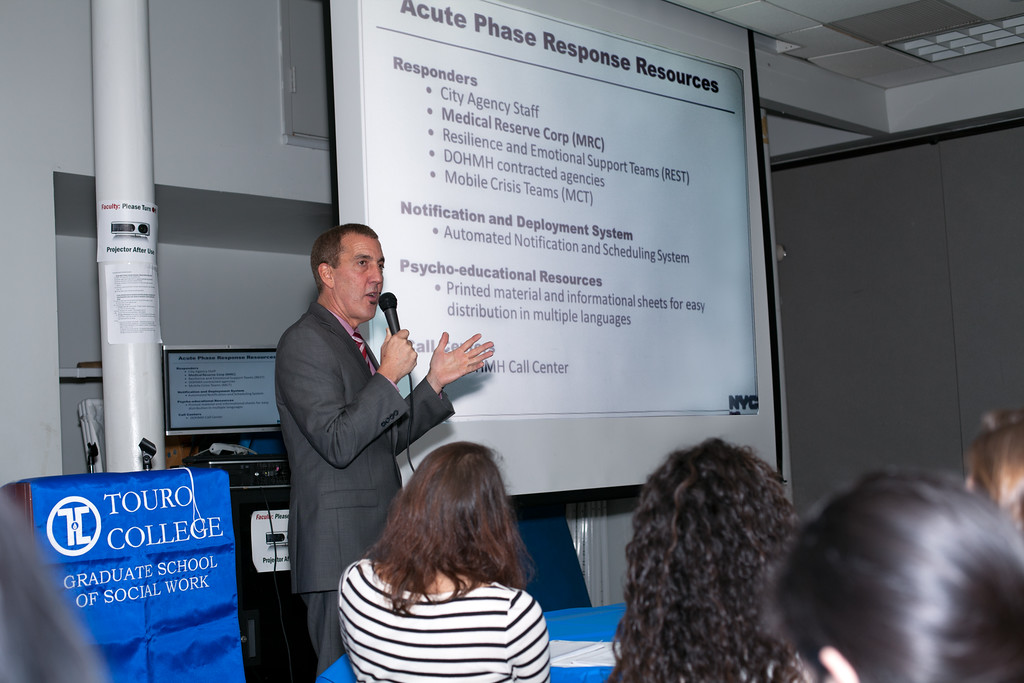News
The Role of Social Work When Disaster Strikes
Experts Share Advice on Addressing Mental Health after Catastrophes

A select group of highly-trained social workers and mental healthcare professionals were in the spotlight at the Touro College Graduate School of Social Work (GSSW) Community Day event, “When Disaster Strikes: The Role of Social Work,” held at the school’s midtown campus in Manhattan on Nov. 24.
From triage to posttraumatic stress disorder (PTSD), experts shared their personal stories and insights on the best ways to address the mental health of individuals in the wake of catastrophic disasters, both natural and manmade.
“Nobody who sees a disaster is untouched by it,” said Donald Decker, Director of New York City Dept. of Health Disaster Preparedness and Response, who, along with James Halpern, Madeline Miller, Sarri Singer and Michael Reilly, discussed what mental health professionals have learned from the tragedy of 9/11 and other acts of terrorism, as well as organic threats to health and safety such as Hurricane Sandy, swine flu outbreaks, and the current Ebola crisis.
In the aftermath of a catastrophe, Decker said, the number of people impacted psychologically can outweigh the number of individuals with medical injuries by as much as 4:1, a surprising statistic that challenged preconceived notions about the nature of caregiving after a disaster. The difference between traditional mental health services (MHS) and disaster MHS, he added, is that disaster MHS is “action-oriented” and “outreach based” with a prescribed core of “psychological first aid” steps to ensure a sense of safety, calm, connectedness, hope, and self-efficacy.
When disaster strikes, professionals are trained to respond to the needs of children and the elderly, who are most at risk for conditions like generalized anxiety disorder, PTSD, and depression.
Decker further described New York City’s “Resilience and Emotional Support Team.” Known better by its acronym REST, its name intentionally omits the words, “mental health,” which for some, still carries a stigma that might prevent them from accessing support.
Other mental health professionals at community day included James Halpern, a professor of psychology and director of the Institute for Disaster Mental Health at SUNY New Paltz, who responded to the scene after the massacre at Sandy Hook Elementary School in 2012. He observed that while faculty members and school administrators were exemplary and heroic in their response to the catastrophic event, officials in state-level leadership positions were remiss in their communications with family, and he recommended that municipal leaders undergo improved training in this area.
The way in which disaster survivors grieve can vary greatly between genders and cultures and those differences should be acknowledged and respected, several of the presenters said. All agreed that faith-based clergy, as well as mental health clinicians, can be equally effective in disaster counseling and that “cross training” between those professions can be therapeutic.
Michael Reilly, director at the Center for Disaster medicine at New York Medical College, part of the Touro College and University System, said most health problems in patients after a disaster are not due to acute injuries, such as a broken leg, but are the exacerbation of existing medical conditions. “It’s not just the urgent care of the victims, but the basic needs of chronic health problems, like diabetes and high blood pressure, that must be met,” he said.
Early in the session, Decker said that generally speaking, individuals may be more psychologically impacted by man- made disasters− acts of terror, for instance− than by a natural disaster, such as an earthquake, because the latter involves a beginning, a middle, and an end. The former is more traumatizing because terrorism is the outcome of unexplained human motives and emotions.
Despite the various worst-case scenarios that were discussed, Decker was reassuring about disaster survivors’ ability to heal, saying that psychological reactions to disasters are generally normal, most individuals will use positive coping skills, and most people recover from traumatic events.
Dr. Steven Huberman, Dean of the GSSW at Touro College, underscored the importance of effective counseling in this region. “Throughout history, New York has responded to threats and disasters with strength and resilience. Our ability to cope with human and man-made cataclysms is due to superior professionals such as our distinguished Community Day panel. The Touro College Graduate School of Social Work is proud to have brought together 150 of our students and faculty to plan for major metropolitan emergencies.”
The event was coordinated and organized by Prof. Allison Bobick, Director of Student Advancement for the GSSW.
For more information, contact:
Department of Health and Mental Hygiene www.nyc.gov/health
Human Services Council www.humanservicescouncil.org/American Psychological Association Disaster Response Network www.apa.org

